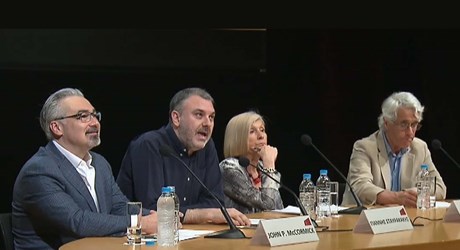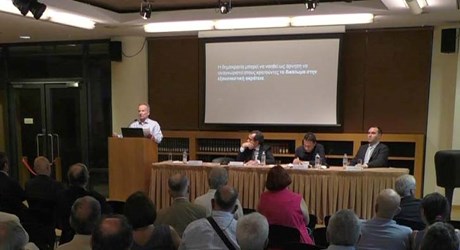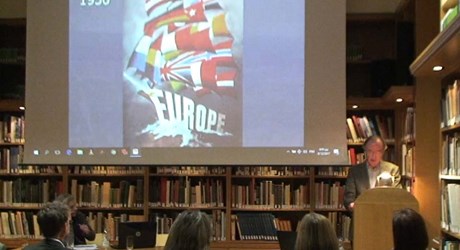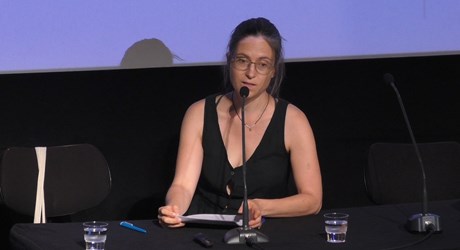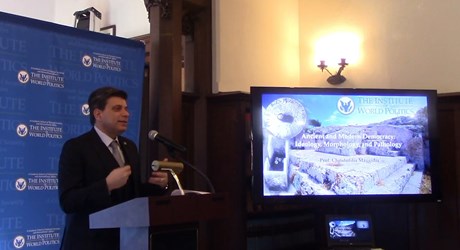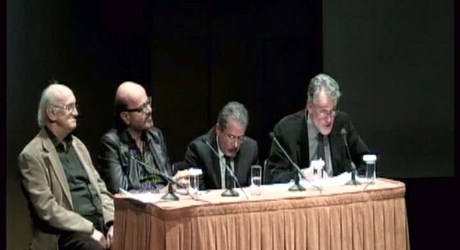
Crouch Colin
McCormick John
Mouffe Chantal
Σταυρακάκης Γιάννης
Γλώσσα
Αγγλική, Ελληνική (εισαγωγή)
Ημερομηνία
31/05/2015
Διάρκεια
02:08:10
Εκδήλωση
Λέξεις & Σκέψεις στη Στέγη 2014 – 2015
Χώρος
Στέγη Γραμμάτων και Τεχνών
Διοργάνωση
Στέγη Γραμμάτων και Τεχνών του Ιδρύματος Ωνάση
Κατηγορία
Πολιτική
Ετικέτες
δημοκρατία, θεσμoί, δημοκρατική αντιπροσώπευση, δημοκρατικό έλλειμμα, παγκοσμιοποίηση, διαπλοκή, εξτρεμισμός, λαϊκισμός
Scroll down for English Version
Στην ανάρτηση αυτή, οι ομιλίες δημοσιεύονται στην αγγλική γλώσσα, είτε στην αγγλική πρωτότυπη εκφορά τους είτε με παράλληλη μετάφραση από τα ελληνικά στα αγγλικά.
Αν θέλετε να παρακολουθήσετε την εκδήλωση με τις ομιλίες δημοσιευμένες στην ελληνική γλώσσα, πατήστε εδώ.
The event is part of the Cycle Fast Forward Festival 2
Everyone is talking about a crisis of democracy. The elements of the crisis are many and operate on multiple levels, from the national decision-making process, which is gradually moving beyond the reach of popular democratic control, to the steady erosion and undermining of the institutions of representation, the unequal distribution of power between the many and the few, the degrading of public space, and political cynicism. And the crisis has manifested itself on multiple levels, too, spreading upwards from the local and the national to the ‘democratic deficit’ of the EU and the political consequences of globalization, whose symptoms include political alienation, corruption, extremism, and the emergence of the struggle between populism and anti-populism as the key ideological fault line in contemporary society. But how can we evaluate this crisis? How is it interconnected with the economic crisis? How does it intersect with the historical evolution and implementations of the democratic ideal? Have we already passed irreversibly into a post-democratic era? Can we still hope for a resurgence of democracy, and if so how is this to come about? Is populism a threat, or might it serve as a correctional movement with the potential to reverse the crisis facing democracy?
With:
Colin Crouch: Professor Emeritus of the University of Warwick and external scientific member of the Max Planck Institute for the Study of Societies at Cologne (‘How can we best challenge post-democracy?’)
John P. McCormick: Professor of Political Science at the University of Chicago (‘The Contemporary Crisis of Democracy and the Populist Cry of Pain’)
Chantal Mouffe: Professor of Political Theory at the Centre for the Study of Democracy at the University of Westminster in London (‘Radical Democracy and Agonistic Politics’)
Scientific oversight & co-ordination:
Yannis Stavrakakis: Professor of Political Discourse Analysis at the Aristotle University of Thessaloniki
Ο Κόλιν Κράουτς είναι ομότιμος καθηγητής του Πανεπιστημίου του Warwick και εξωτερικό επιστημονικό μέλος του Ινστιτούτου Max Planck για την Μελέτη των Κοινωνιών. Είναι, επίσης, αντιπρόεδρος της Βρετανικής Ακαδημίας στον τομέα των κοινωνικών επιστημών. Υπήρξε επικεφαλής του ευρωπαϊκού έργου GUSTO στο πλαίσιο του 7ου ΠΠ. Οι δημοσιεύσεις του εστιάζονται στους τομείς της συγκριτικής Ευρωπαϊκής Κοινωνιολογίας και των σχέσεων εργασίας, της οικονομικής κοινωνιολογίας, καθώς και σε τρέχοντα ζητήματα της Βρετανικής και Ευρωπαϊκής πολιτικής. Στις πρόσφατες δημοσιεύσεις του περιλαμβάνονται τα βιβλία: Μεταδημοκρατία (Εκκρεμές, 2006), Capitalist Diversity and Change: Recombinant Governance and Institutional Entrepreneurs (2005), Ο περίεργος μη θάνατος του νεοφιλελευθερισμού (Εκκρεμές, 2014), Making Capitalism Fit for Society (Polity, 2013), και Governing Social Risksin Post-Crisis Europe (Edward Elgar, 2015).
Colin Crouch is a Professor Emeritus of the University of Warwick and external scientific member of the Max Planck Institute for the Study of Societies at Cologne. He is vice-president for social sciences of the British Academy. He has published within the fields of comparative and economic sociology, and contemporary issues in British and European politics. His most recent books include Post-Democracy (Polity, 2004); Capitalist Diversity and Change: Recombinant Governance and Institutional Entrepreneurs (2005); The Strange Non-death of Neoliberalism (Polity, 2011); Making Capitalism Fit for Society (Polity, 2013); and Governing Social Risks in Post-Crisis Europe (Edward Elgar, 2015).
Ο Τζων Μακ Κόρμικ είναι καθηγητής πολιτικών επιστημών στο Πανεπιστήμιο του Σικάγο. Είναι συγγραφέας των βιβλίων: Machiavellian Democracy (Cambridge University Press, 2011), Carl Schmitt's Critique of Liberalism: Against Politics as Technology (Cambridge University Press, 1997), Weber, Habermas and Transformations of the European State: Constitutional, Social and Supranational Democracy (Cambridge University Press, 2006). Έχει επίσης δημοσιεύσει πληθώρα επιστημονικών άρθρων πάνω στην ιστορία της πολιτικής σκέψης, τη θεωρία της δημοκρατίας και το συνταγματικό δίκαιο.
John P. McCormick is Professor of Political Science at the University of Chicago. He is the author of Machiavellian Democracy (Cambridge University Press, 2011); Carl Schmitt's Critique of Liberalism: Against Politics as Technology (Cambridge University Press, 1997); Weber, Habermas and Transformations of the European State: Constitutional, Social and Supranational Democracy (Cambridge University Press, 2006); and numerous articles on the history of political thought, democratic theory and constitutional law.
Η Chantal Mouffe [Σαντάλ Μουφ] είναι καθηγήτρια Πολιτικής Θεωρίας στο Τμήμα Πολιτικής Επιστήμης και Διεθνών Σχέσεων του Πανεπιστημίου του Ουέστμινστερ (Λονδίνο). Έχει διδάξει σε πολλά πανεπιστήμια στην Ευρώπη, τη Βόρεια και Νότια Αμερική, ενώ έχει αναλάβει ερευνητικές θέσεις στα Πανεπιστήμια Χάρβαρντ, Κορνέλ, Καλιφόρνιας καθώς και στο Ινστιτούτο Ανωτάτων Σπουδών του Πρίνστον και στο Εθνικό Κέντρο Επιστημονικής Έρευνας στο Παρίσι.
Μαζί με τον Ernesto Laclau έχει συμβάλει στη δημιουργία της επονομαζόμενης Σχολής του Έσσεξ για την ανάλυση λόγου (Essex School of discourse analysis).
Από το διεθνούς φήμης έργο της έχουν μεταφραστεί στην ελληνική γλώσσα τα βιβλία Το δημοκρατικό παράδοξο (Πόλις, 2004) και Επί του πολιτικού (2010), ενώ άρθρα της έχουν συμπεριληφθεί στους συλλογικούς τόμους Φεμινιστική θεωρία και πολιτισμική κριτική (Νήσος, 2006) και Η απραγματοποίητη δημοκρατία (Futura 2010).
Στις κυριότερες διεθνείς δημοσιεύσεις της περιλαμβάνονται επίσης τα βιβλία Ηγεμονία και σοσιαλιστική στρατηγική: Προς μια ριζοσπαστική δημοκρατική πολιτική [Hegemony and socialist strategy: Towards a radical democraticpolitics (Verso, 1985 που έγραψε μαζί με τον Ernesto Laclau και Αγωνισμός: Μια πολιτική σκέψη για τον κόσμο [Agonistics: Thinking The World Politically (Verso, 2013)].
Chantal Mouffe is Professor of Political Theory at the University of Westminster in London. She has taught and researched in many universities throughout Europe, North and South America, and she is a corresponding member of the Collège International de Philosophie in Paris. She is the editor of Gramsci and Marxist Theory (Routledge and Kegan Paul, 1979); Dimensions of Radical Democracy: Pluralism, Citizenship, Community (Verso, 1992); Deconstruction and Pragmatism (Routledge, 1996); and The Challenge of Carl Schmitt (Verso, 1999); the co-author with Ernesto Laclau of Hegemony and Socialist Strategy: Towards a Radical Democratic Politics (Verso, 1985); and the author of The Return of the Political (Verso, 1993); The Democratic Paradox (Verso, 2000); On the Political (Routledge, 2005) and Agonistics: Thinking the World Politically (Verso 2013).
Ο Γιάννης Σταυρακάκης σπούδασε πολιτική επιστήμη στο Πάντειο Πανεπιστήμιο και ανάλυση λόγου στο Πανεπιστήμιο του Essex. Εργάστηκε στα Πανεπιστήμια του Essex και του Nottingham, και από το 2006 διδάσκει ανάλυση πολιτικού λόγου και πολιτική θεωρία στο Τμήμα Πολιτικών Επιστημών του Αριστοτελείου Πανεπιστημίου Θεσσαλονίκης. Στα ελληνικά κυκλοφορούν οι μελέτες του Ο Λακάν και το πολιτικό (Ψυχογιός, 2008) και Η λακανική αριστερά (Σαββάλας, 2012), ενώ το τελευταίο διάστημα έχει συνεπιμεληθεί τους συλλογικούς τόμους: Το πολιτικό στη σύγχρονη τέχνη (Εκκρεμές, 2008), Όψεις λογοκρισίας στην Ελλάδα (Νεφέλη, 2008), Νεολαία: ο αστάθμητος παράγοντας; (Πολύτροπον, 2008). Τελευταίο του βιβλίο (από κοινού με τον Νικόλα Σεβαστάκη) η μελέτη Λαϊκισμός, αντιλαϊκισμός και κρίση (Νεφέλη, 2012). Υπήρξε αντιπρόεδρος της Ελληνικής Εταιρείας Πολιτικής Επιστήμης, στο πλαίσιο της οποίας συμμετείχε στην ίδρυση του Θεματικού Δικτύου για την Ανάλυση Πολιτικού Λόγου, ενώ το διάστημα 2014-5 υπήρξε Κύριος Ερευνητής του προγράμματος "POPULISMUS: Λαϊκιστικός λόγος και δημοκρατία". Ζει στη Θεσσαλονίκη.
Yannis Stavrakakis is Professor of Political Discourse Analysis at the Aristotle University of Thessaloniki. His research primarily focuses on contemporary political theory (with emphasis on psychoanalytic and poststructuralist approaches) and on the analysis of ideology and discourse in late modern societies. He is the author of Lacan and the Political (Routledge, 1999) and The Lacanian Left (Edinburgh University Press/ SUNY Press, 2007), co-author of Populism, Anti-Populism and Crisis (Nefeli, 2012) and co-editor of Discourse Theory and Political Analysis (Manchester University Press, 2000) and The Political in Contemporary Art (Ekkremes, 2008). He was Principal Investigator of the research project “POPULISMUS: Populist Discourse and Democracy”.


